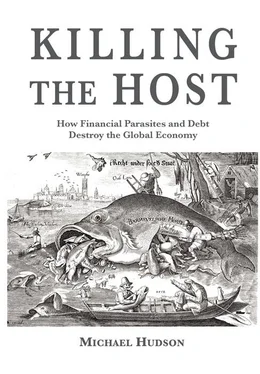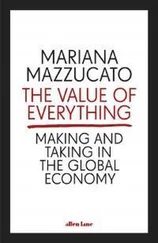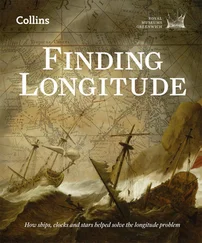Meanwhile, the One Percent endow business schools and “think tanks” to convince the public that there is no such thing as unearned income and wealth. The demographic effect of blurring this concept can be seen in statistics of rising suicide rates, shortening life spans and falling birth rates, and emigration.
A blind spot to these corrosive effects of financial practice is what makes post-classical rentier ideology “value-free.” Making money from privatization, asset-price inflation (the Bubble Economy) and corporate looting is euphemized as “wealth creation.” Banks create credit to bid up prices of existing real estate, stocks and bonds, while the stock market serves as a vehicle for corporate raiding and leveraged buyouts to replace equity with high-interest bonds. Instead of alleviating debt pressures, the financial system raises dependency on further credit to carry the debt burden.
The destructive character of financial conquest
The owl of wisdom only flies at night. Only after a major collapse is it easier to see the wrongheaded turns that have been taken. Debt-leveraged buyouts have not financed new capital investment, but have bled companies to pay bondholders and activist shareholders. But until Warren Buffet characterized Wall Street’s derivatives as weapons of mass financial destruction, most economists failed to recognize the destructive power of debt creation and how the One Percent lend out their savings to indebt the 99 Percent. The effect is much like the physicist J. Robert Oppenheimer’s 1965 description of the atom bomb’s Trinity Explosion, when he recalled the Bhagavad Gita ’s words of Vishnu: “I am become death, destroyer of worlds.”
From F. Scott Fitzgerald’s The Great Gatsby to Tom Wolfe’s Bonfire of the Vanities , novelists have symbolized the very rich as irresponsible auto drivers killing innocent pedestrians. “They were careless people, Tom and Daisy,” wrote Fitzgerald; “they smashed up things and creatures and then retreated back into their money or their vast carelessness or whatever it was that kept them together, and let other people clean up the mess they had made.”
That is what makes the rich different. The collateral damage from their attacks is as irresponsible as it is devastating. They are insensitive to how their actions impact the life of others. Posing as “job creators,” rentiers claim to be proxies acting like shepherds as a virtual government. Their wealth is supposed to trickle down, somehow, as if by helping themselves financially, they also will help economies grow. So today’s creditors call financialization “wealth creators,” whom Goldman Sachs describes as “doing God’s work.”
Just as the drivers in Gatsby and Bonfire responsible for crashes left others to bear the blame, so the One Percent seeks to shift responsibility onto the financial victims (“the madness of crowds”). Governments are blamed for running deficits, despite the fact that they result mainly from tax favoritism to the rentiers. Having used FICA paycheck withholding as a ploy to cut progressive tax rates on themselves since the 1980s, the One Percent blame the indebted population for living longer and creating a “retirement problem” by collecting the Social Security and pensions.
This is financial warfare — and not all wars end with the victory of the most progressive parties. The end of history is not necessarily utopia. The financial mode of conquest against labor and industry is as devastating today as in the Roman Republic’s Social War that marked its transition to Empire in the 1 stcentury BC. It was the dynamics of debt above all that turned the empire into a wasteland, reducing the population to debt bondage and outright slavery.
Livy, Plutarch and other Roman historians placed the blame for their epoch’s collapse on creditors. Tacitus reports the words of the Celtic chieftain Calgacus, c. 83 AD, rousing his troops by describing the empire they were to fight against:
Robbers of the world, having by their universal plunder exhausted the land … If the enemy is rich, they are rapacious; if he is poor, they lust for dominion; neither the east nor the west has been able to satisfy them. … To robbery, slaughter, plunder, they give the lying name of empire. They make a wasteland and call it peace.
The peace brought by Rome turned out to be a world reverting to subsistence production on the land as cities became deserted. Rome became the model of what happens to economies that do not annul their debts but polarize between creditors and debtors. Its history — and hence, antiquity — ended in a convulsion of depopulation and a Dark Age.
Commanded by a creditor oligarchy, Rome’s imperial conquest was belligerent, with an oppressive anti-labor spirit that Tacitus explained elsewhere ( Agricola 32): “It belongs to human nature to hate those you have injured.” The financial sector’s awareness of how rapaciously it obtains its wealth makes it fear and hence hate its victims.
So we are brought back to the basic theme of this book: Contrary to expectations when the Industrial Revolution was gaining momentum, finance is stifling industrial potential, raising the specter of lapsing back into the ancient usury dynamic with exponentially accruing debt dependency. Much like creditors in ancient Rome, today’s financial power seeks to replace democracy with oligarchy. We are seeing a resurgence of “primitive accumulation” by debt creation, foreclosure and privatization.
The oligarchic strategy is to politicize this financial drive. Here as usual, novelists are ahead of the economics textbooks. As Mario Puzo summarized matters in his movie scenario for The Godfather , Part III (1990):
Vincent Mancini:Don Lucchesi, you are a man of finance and politics. These things I don’t understand.
Don Lucchesi:You understand guns?
Vincent Mancini:Yes.
Don Lucchesi:Finance is a gun. Politics is knowing when to pull the trigger.
The ECB, EU commission and the IMF held the financial gun to Greece’s head in June 2015, and pulled the political trigger to pressure Greece to a “regime change” by threatening the Greek Prime Minister Tsipras with financial crisis if he did not adhere to the program negotiated by the pro-austerity Pasok and Conservative coalition he had recently been elected to replace. The weapon perhaps is better characterized as a financial noose, drawn tighter each day.
28. Is the Mode of Parasitism overshadowing the Mode of Production?
“In an era of finance, finance mostly finances finance.”
— Jan Toporowski, Why the World Economy Needs a Financial Crash and Other Critical Essays on Finance and Financial Economics (London: 2010)
Nearly all economic writings published in the late 19 thand early 20 thcentury defined wealth in terms of the means of production: factories, plant and machinery, technology and public investment in infrastructure and education. Seeing the Industrial Revolution’s soaring rise in productivity stemming from the use of energy — from water power to steam power to internal combustion engines and electrification — economists anticipated a leisure economy.
Today’s deepening austerity, unemployment and emigration is not a failure of this technological potential; nor is it the kind of overproduction crisis that early critics of industrial capitalism warned about: wage labor being paid too little to buy the goods it produces. Employers exploiting wage labor are always a problem, of course. But today’s overwhelming economic problem is predatory finance, to a degree that few expected a century ago, with the notable exception of Thorstein Veblen.
Читать дальше












